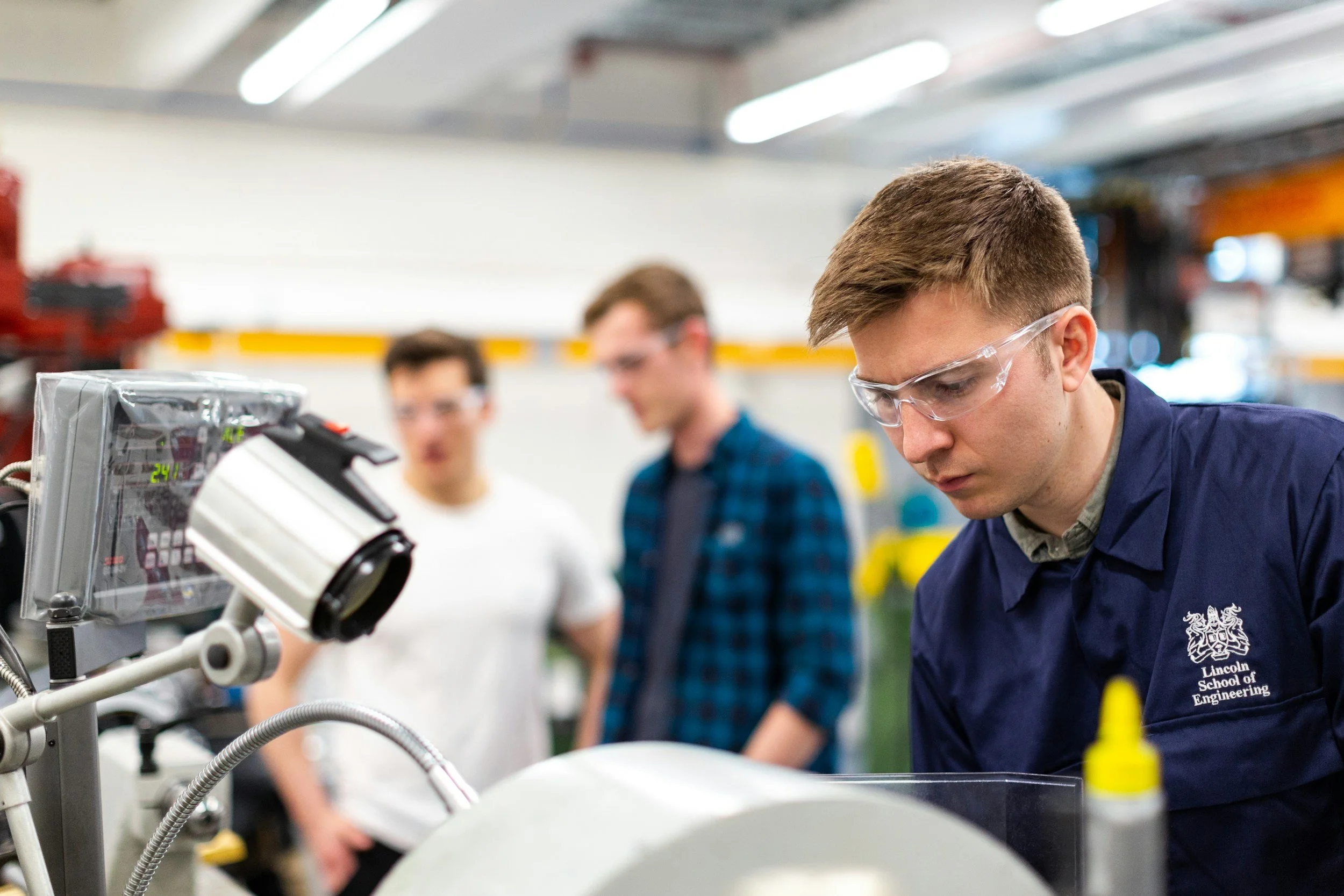Engineering Apprenticeships
Train Operatives & Technicians Across Key Specialisms
Engineering and Manufacturing Foundation Apprenticeship
Level 2 Apprenticeship Standard
Role Profile
Engineering Operatives carry out a range of routine engineering activities working independently or as part of a team. They support manufacturing and engineering businesses by preparing, operating, and maintaining equipment, following technical documentation, and applying health, safety, and environmental practices. Their work contributes to producing reliable products and services while supporting continuous improvement in quality and efficiency.
Typical Duration
8 months
Course Content
Apprentices develop knowledge, skills, and behaviours in:
Health, safety and environment: Understanding and following regulations, using PPE, maintaining safe work practices, and disposing of waste responsibly.
Engineering and manufacturing principles: Recognising industry processes, materials, and basic production methods.
Tools, equipment and machinery: Preparing, using, maintaining and storing tools correctly for a range of engineering tasks.
Technical information: Reading and interpreting drawings, job specifications and quality standards.
Workplace preparation: Planning, organising and maintaining a clean and efficient workspace.
Quality and inspection: Carrying out simple checks and ensuring products meet required specifications.
Communication and teamwork: Working with supervisors and colleagues to complete engineering and manufacturing tasks effectively.
Sustainability: Understanding environmental impacts and contributing to efficient, low-waste practices.
Pathways (Specialist Options)
As a foundation standard, this apprenticeship provides a broad base across engineering and manufacturing disciplines.
Learners may go on to specialise in areas such as:
Maintenance
Mechanical
Fabrication and Welding
Electrical/Electronic
Technical Support
Materials Processing and Finishing
Typical Job Roles
Servicing and Maintenance Operative
Machine Setter / Operative
Mechanical Engineering Operative
Fabricator
Engineering Fitter
Multi-disciplined Engineering Operative
Materials Processing and Finishing Operative
Technical Support Operative
End Point Assessment (EPA)
Knowledge Test – assessing understanding of engineering and manufacturing principles, health and safety, and sustainability.
Practical Assessment – demonstrating competence through observed tasks, projects, or a portfolio of evidence.
Both elements must be passed to achieve the apprenticeship.
Additional Information and Requirements
The apprentice must normally be age 16 to 21 at the start of their apprenticeship.
Employers may set their own entry requirements.
Funding Information
Funding Band: £4.500
Non-levy Employer Contribution: £225 (5%)
Government funding support may be available depending on apprentice age and employer size.
Under DfE Apprenticeship funding Rules 25/26 the employer qualifies for up to £2,000 per foundation apprentice, subject to retention and progression.
Progression Routes
Apprentices can progress to:
Level 2 or Level 3 apprenticeships in engineering, manufacturing, or maintenance
Skilled operative roles within engineering and manufacturing environments
Further education or technical training pathways in related disciplines
Engineering Operative
Level 2 Apprenticeship Standard
Role Profile
Engineering Operatives carry out a range of routine engineering activities working independently or as part of a team. They support manufacturing and engineering businesses by preparing, operating, and maintaining equipment, following technical documentation, and applying health, safety, and environmental practices. Their work contributes to producing reliable products and services while supporting continuous improvement in quality and efficiency.
Typical Duration
12 to 18 months
Course Content
Apprentices develop knowledge, skills, and behaviours in:
• Health, safety and environment: working safely, identifying hazards, and complying with statutory regulations.
- Technical information: reading and interpreting engineering data, drawings, and specifications.
- Tools and equipment: selecting, preparing, and using the correct tools, machines, and materials.
- Quality and efficiency: meeting production standards, identifying and preventing defects, and contributing to continuous improvement.
- Teamwork and communication: working effectively with colleagues, supervisors, and other departments.
Pathways (Specialist Options)
Apprentices will specialise in one of the following areas:
Maintenance: fault finding, repairing, testing, and maintaining engineering systems.
Mechanical: assembling and dismantling components, using machinery and hand tools, joining and securing parts.
Fabrication: cutting, forming, shaping, and joining metal materials into products.
Technical Support: preparing and operating equipment, inspecting components, quality assurance, and documentation.
Electrical/Electronic: assembling, testing, and maintaining electrical or electronic circuits and equipment.
Materials, Processing & Finishing: treating, finishing, and preparing materials or products to meet required specifications.
Typical Job Roles
Engineering Operative
Maintenance Operative
Mechanical Engineering Operative
Electrical/Electronic Operative
Fabricator
Technical Support Operative
Materials Processing/Finishing Operative
End Point Assessment (EPA)
Practical Observation (demonstration of core and specialist skills).
Professional Discussion (supported by a reflective portfolio of evidence).
Both elements must be passed to achieve the apprenticeship.
Additional Information and Requirements
Apprentices must achieve English and maths at Level 1 (if not already held) and attempt Level 2 before EPA.
Employers may set their own entry requirements.
Funding Information
Funding Band: £10,000
Non-levy Employer Contribution: £500 (5%)
Government funding support may be available depending on apprentice age and employer size.
Progression Routes
Apprentices can progress to:
Level 3 Engineering Technician apprenticeships
Specialist technical roles in maintenance, fabrication, mechanical, or electrical engineering
- Higher education pathways in engineering and related fields
Level 3 Engineering Maintenance Technician
Level 3 Apprenticeship Standard
Role Profile
Engineering Maintenance Technicians working under this Standard are employed in a variety of industries where engineering plant, equipment and systems are used — such as manufacturing, processing, utilities, energy, transport and chemical sectors.
Their core role is to maintain the safe, efficient and reliable operation of engineering plant, equipment and systems within a single discipline (mechanical, electrical or instrumentation/control). They work to industry standards, regulations and organisational procedures to inspect, service, fault-find, repair, replace and optimise equipment.
Typical Duration
36 to 42 months
Course Content
Apprentices will develop the knowledge, skills, and behaviours to carry out planned and reactive maintenance safely and efficiently within a single engineering discipline.
They will learn to:
Follow health, safety and environmental requirements, risk assessments and safe systems of work.
Apply engineering principles to maintain, fault-find and repair plant, equipment and systems.
Use hand tools, measuring devices and test equipment correctly and safely.
Carry out inspections, preventative maintenance, and component replacements to reduce downtime.
Record and communicate technical information clearly to colleagues and supervisors.
Work effectively as part of a team to ensure plant and equipment reliability and performance.
Pathways (Specialist Options)
Apprentices will specialise in one of the following areas:
Mechanical Maintenance Technician – maintaining and repairing mechanical components such as pumps, valves and gearboxes.
Electrical Maintenance Technician – maintaining, testing and commissioning electrical systems, motors and power supplies.
Control & Instrumentation Maintenance Technician – monitoring, testing and maintaining process control and instrumentation systems.
Typical Job Roles
Engineering Maintenance Technician
Mechanical Maintenance Technician
Mechanical Craftsperson
Electrical Engineering Maintenance Technician
Control & Instrumentation Maintenance Technician
End Point Assessment (EPA)
Practical Observation – the apprentice is observed completing real work tasks, showing their ability to apply skills safely and effectively.
Professional Interview – a structured discussion supported by evidence from their portfolio, assessing knowledge, understanding, and professional behaviours.
Knowledge Test – a written or online test assessing core engineering and maintenance principles.
All elements must be passed to achieve the apprenticeship.
Additional Information and Requirements
Apprentices must achieve English and maths at Level 1 (if not already held) and attempt Level 2 before EPA.
Employers may set their own entry requirements.
Funding Information
Funding Band: £27,000
Non-levy Employer Contribution: £1,350 (5%)
Additional funding support may be available depending on apprentice age and employer size.
Progression Routes
Level 4/5 engineering technician or advanced maintenance roles.
Specialist roles in engineering maintenance, reliability engineering, maintenance management.
Professional registration (e.g., EngTech) via professional engineering institutions for eligible apprentices.










